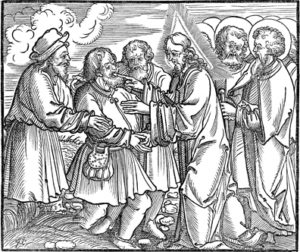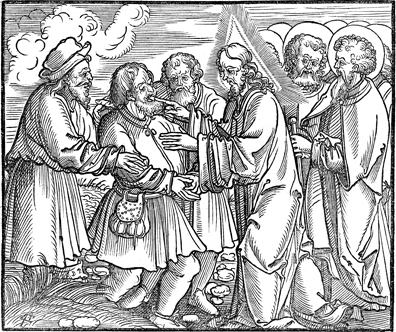
Central idea: The revelation of God’s mercy. Doctrine: Jesus used signs to convey his gifts and so do the Sacraments of the Church. Practical application: Go to the Sacraments and to the needy.
Written as an aid for homilists and a resource for the faithful, this doctrinal homily outline (1) provides insights into the Lectionary readings, (2) explicates a doctrine of Catholic Faith or morals from them, and (3) shows specific ways lay persons can live these truths. (To read more about this approach, click here.)
This outline is written to be in accord with the Homiletic Directoryissued by the Congregation for Divine Worship and the Discipline of the Sacraments (2014).
To view Lectionary 128, click here.
Central idea: The revelation of God’s mercy
Reading 1 Is 35:4-7a
Thus says the LORD:
Say to those whose hearts are frightened:
Be strong, fear not!
Here is your God,
he comes with vindication;
with divine recompense
he comes to save you.
Then will the eyes of the blind be opened,
the ears of the deaf be cleared;
then will the lame leap like a stag,
then the tongue of the mute will sing.
Streams will burst forth in the desert,
and rivers in the steppe.
The burning sands will become pools,
and the thirsty ground, springs of water.
- God is the savior of man, both of his body and of his soul.
- He “pays back” those who know they are in need: the frightened, the blind, the deaf, the lame, the mute, and the thirsty.
- This vindication of the needy will be a time of incomparable joy.
Responsorial Psalm Ps 146:7, 8-9, 9-10
R. Praise the Lord, my soul!
The God of Jacob keeps faith forever,
secures justice for the oppressed,
gives food to the hungry.
The LORD sets captives free.The LORD gives sight to the blind;
the LORD raises up those who were bowed down.
The LORD loves the just;
the LORD protects strangers.The fatherless and the widow the LORD sustains,
but the way of the wicked he thwarts.
The LORD shall reign forever;
your God, O Zion, through all generations. Alleluia.
- God cares for those in need.
- This is promised and partly experienced in the Old Covenant.
- It is real but limited during the public life of our Lord.
- It is partly experienced and has become a Christian duty in this era of the Church.
- It will be an eternal reality in eternal life.
Reading 2 Jas 2:1-5
My brothers and sisters, show no partiality
as you adhere to the faith in our glorious Lord Jesus Christ.
For if a man with gold rings and fine clothes
comes into your assembly,
and a poor person in shabby clothes also comes in,
and you pay attention to the one wearing the fine clothes
and say, “Sit here, please, ”
while you say to the poor one, “Stand there, ” or “Sit at my feet, ”
have you not made distinctions among yourselves
and become judges with evil designs?Listen, my beloved brothers and sisters.
Did not God choose those who are poor in the world
to be rich in faith and heirs of the kingdom
that he promised to those who love him?
- What an amazing thing Christ taught the apostles and the apostle James teaches us.
- Thomas Jefferson put part of this truth into his own famous words: All men are created equal.
- That is a lot but it is not the whole truth. From Christ’s perspective we should say all men are created equal and in this life they remain equal in the sight of God no matter their material or spiritual condition. Therefore, God is ready to give salvation to every person who wants it.
- James sets out God’s own (and so ours by duty) preferential option for the poor and those in need in any way. It is not that God does not love the rich but the poor are in greater material need.
- James point out an irony. In one way the poor are richer and so more important than the rich because God chose “those who are poor in the world to be rich in faith and heirs of the kingdom.” These poor find it easier to call on Him because they not only know their need but are reminded of it day and night. The rich, therefore, are in need, too, since they find it harder to call on the Lord for their salvation.
Gospel Mk 7:31-37
Again Jesus left the district of Tyre
and went by way of Sidon to the Sea of Galilee,
into the district of the Decapolis.
And people brought to him a deaf man who had a speech impediment
and begged him to lay his hand on him.
He took him off by himself away from the crowd.
He put his finger into the man’s ears
and, spitting, touched his tongue;
then he looked up to heaven and groaned, and said to him,
“Ephphatha!”— that is, “Be opened!” —
And immediately the man’s ears were opened,
his speech impediment was removed,
and he spoke plainly.
He ordered them not to tell anyone.
But the more he ordered them not to,
the more they proclaimed it.
They were exceedingly astonished and they said,
“He has done all things well.
He makes the deaf hear and the mute speak.”
- Isaiah’s prophecy is fulfilled in Christ: “the ears of the deaf [are] cleared” and “the tongue of the mute” sing.
- Our Lord uses physical signs in curing this man’s deafness and speech impediment. “He put his finger into the man’s ears and, spitting, touched his tongue; then he looked up to heaven and groaned, and said to him, ‘Ephphatha!’— that is, ‘Be opened!’”
- Thus, “Christ’s compassion toward the sick and his many healings of every kind of infirmity are a resplendent sign that ‘God has visited his people’ and that the Kingdom of God is close at hand” (CCC 1503).
- We can see Christ’s pity for the poor man in his groan.
- Moved by compassion, he heals the man.
- Christ, who is he kingdom of God, brings the kingdom of God to that man by restoring what is broken in his human nature—his inability to hear and speak.
- The Catechism goes on to say, “Jesus’ compassion extends not only to the human body but the soul, too, so Jesus also forgives sin” (CCC 1503).
- Jesus’ mercy is not condescending. Rather, “He loves the sick, whether in body or soul, so much that he identifies himself with them and makes our concern for them a condition of our salvation: ‘I was sick and you visited me’” (CCC 1503). Our Lord puts himself into debt to us if we show mercy to those around us.
- This is the basis of the preferential love for the poor of body or soul. “Christians, therefore, direct special attention toward those who suffer in body or soul and seek to comfort them with care and healing” (CCC 1503).
Doctrine: Jesus used signs to convey his gifts and so do the Sacraments of the Church
- In his preaching, Jesus often used natural signs to reveal the secrets of the kingdom of heaven (CCC 1151), such as in the parable of the sower where he used the sowing of seeds to teach about persons’ responses to hearing the Word of God.
- As we saw in the Gospel, Jesus also uses “signs of creation” in his physical healings (CCC 1151). For example, in today’s reading, Jesus uses touch, reminiscent of God forming Eve from a rib taken from Adam’s side.
- And in his own passion and death Christ gave new meaning to the signs of the Exodus and the Passover. These signs are “taken up by Christ” who is himself “the meaning of all these signs” (CCC 1151).
- Like Moses who freed Israel from slavery to Egypt, Our Lord frees us from slavery to sin.
- Like the Passover Lamb whose innocent blood protected the first-born Jewish sons from death, Christ’s innocent blood protects us from eternal death by the forgiveness of our sins.
- “Since Pentecost, it is through the sacramental signs of his Church that the Holy Spirit carries on the work of sanctification” (CCC 1152). We might easily overlook the fundamental truth that Christ has established a sacramental Church; that is, Christ pours out his graces on humanity largely through the seven sacraments. I’m going to put this in all caps to remind you and me of this most important truth: CHRIST ESTABLISHED A SACRAMENTAL CHURCH!
- The seven sacraments “purify and integrate all the richness of the signs and symbols of the cosmos and of social life” (CCC 1152). Some of these signs are water, oil, sounds (through the spoken word), bread and wine, and touch (through laying on of hands and even through the marital embrace).
- “Further, they fulfill the types and figures of the Old Covenant, signify and make actively present the salvation wrought by Christ, and prefigure and anticipate the glory of heaven” (CCC 1152).
- The sacraments “fulfill the types and figures of the Old Covenant.” For example, Noah’s flood drowned wicked men, but Baptism drowns original and actual sin in us.
- The sacraments “signify and make actively present the salvation wrought by Christ.” For example, the baptismal washing is a sign of inward cleansing from sin which actually effects that inward purification, won by the merits of Christ.
- The sacraments “prefigure and anticipate the glory of heaven.” For example, this same baptismal washing is a sign of the complete innocence and holiness that the saved will experience eternally in heaven.
Practical application: Go to the Sacraments and to the needy
- I’ll put a second truth in all caps: GRACE IS GIVEN THROUGH THE SACRAMENTS! Since God’s grace largely comes to us through the Sacraments, it only makes sense to go to them.
- Don’t delay your own child’s baptism; encourage others to have their children baptized as soon as possible.
- See that your children receive First Confession, First Eucharist, and Confirmation as soon as the Church permits.
- Go to confession frequently and according to a schedule, like every month on a certain day and at a certain time. Go to confession as soon as possible if you are aware of having committing a serious sin.
- Receive Communion frequently, even daily, provided you are in a state of grace.
- Be sure that family members who are in danger of death receive the Sacrament of the Anointing of the Sick.
- If you are a member of the ordained clergy, call on the graces of Holy Orders to conform your will to God’s will.
- If you are married, take advantage of your matrimonial graces to be faithful Christian spouses and parents. Don’t forget that the natural marital act open to life is a renewal of your mutual covenant with God.
- Go also to the needy.
- Since Christ loves them so much and we show our love for Christ by aiding them, and because they are everywhere, even in our own families, we can show our love for Christ and for them whenever we want.
- So, who is needy around you? What can you do for them?
The Homiletic Directory offers the following Catechism points and themes for the Twenty-third Sunday in Ordinary Time:
- CCC 1503-1505: Christ the Physician
- CCC 1151-1152: signs used by Christ; sacramental signs
- CCC 270-271: the mercy of God

Leave a Reply